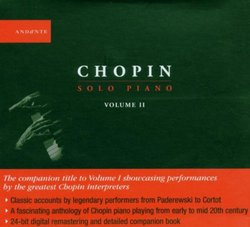| All Artists: Frederic Chopin, Vladimir Horowitz, Edward Kilenyi, Ignace Jan Paderewski, Alexander Brailowsky, Ferruccio Busoni, Francis Planté, Jeanne-Marie Darré, Vladimir Sofronitsky, Alfred Cortot, Alfred Corton, Raoul Koczalski, Emil von Sauer, Artur Rubinstein, Dinu Lipatti, Maryla Jonas, Ignaz Friedman, William Kapell Title: Chopin: Solo Piano, Vol. 2 Members Wishing: 1 Total Copies: 0 Label: Andante Release Date: 3/22/2005 Genres: Dance & Electronic, Classical Styles: Chamber Music, Historical Periods, Classical (c.1770-1830), Modern, 20th, & 21st Century, Instruments, Keyboard Number of Discs: 4 SwapaCD Credits: 4 UPC: 699487119024 |
Search - Frederic Chopin, Vladimir Horowitz, Edward Kilenyi :: Chopin: Solo Piano, Vol. 2
 | Frederic Chopin, Vladimir Horowitz, Edward Kilenyi Chopin: Solo Piano, Vol. 2 Genres: Dance & Electronic, Classical |
Larger Image |
CD DetailsSimilar CDs
|
CD ReviewsA Treasure Trove of Historic Chopin Performances J Scott Morrison | Middlebury VT, USA | 03/24/2005 (5 out of 5 stars) "Collected here on 4 CDs, in Volume 2 of this Andante series, are historic performances of some of Chopin's solo piano works. In Volume 1 were performances of the Waltzes, Impromptus, Scherzos, Andante spianato and Grande polonaise, Ballades, Études, Préludes, the 2nd & 3rd Sonatas, Barcarolle and Berceuse. In Volume 2, CD 1 are the legendary performance of the Op. 10 Études by Edward Kilenyi, plus some single études played by various other great historic artists (including the only student of Chopin to live into the recording era, Francis Planté). On CD 2 are Nocturnes played by such artists as Rubinstein, Paderewski, Sofronitsky, Busoni, Cortot, Lipatti, Maryla Jonas, and Raoul Koszalski. On CD 3 are some Polonaises, most played by Rubinstein, but with single polonaises played by Paderewski, Friedman, Sofronitsky and Jonas. CD 4 is devoted to Mazurkas played by Horowitz, Friedman, Sofronitsky, Kapell and Jonas. Volume 1 was a huge artistic success (although for some strange reason it has not been reviewed here at Amazon.com). The same is true for the present volume. It is hard to imagine any other collection containing so many important historic recordings all in one place. If you are a Chopin lover you will be in heaven. Not all the performances are necessarily the very best available, one supposes--although the marvelous performances far outnumber those about which one might have some question--but the different pianists give us a view of how Chopin playing may have changed or varied over the years. Musically, from start to finish, this is a very satisfying collection. I've spent literally hours and hours listening and comparing with other Chopin performances I own. I know that I would never want to be without this collection. Add to that the very fine presentation with a hard-bound book that contains essays in three languages, and one has a real winner. As to individual performances I would want to single out, let me just mention a few. First of all the Kilenyi performances, which I'd heard a few of in the past but never heard at such length, are terrific. Of course, Kilenyi, who recorded the études of Op. 10 in 1937, had made the first really good recording of the set and they were the standard-bearer for years. (Cortot's first recording of them antedated Kilenyi's but they are, to be honest, not nearly as good; he rectified that in later recordings.) While we're talking about the Études I must mention also the two in E major, No. 3, recorded by Paderewski and Brailowsky. The sound, here as in almost all the examples in this set, is marvelous, and both artists caress the keyboard in such a way that this most romantic of all the études is given sumptuous treatment. Busoni's performance of No. 5 in G flat is in not very good sound (an exception) but there are glints of lightning in his playing. Jean-Marie Darré's performance of Étude No. 6 in G sharp minor 'Thirds' is electrifying. The Nocturnes disc (CD 2) is arranged so that one often gets several performances of a single Nocturne in a row so that one can compared Rubinstein, say, with Paderewski (No. 2) or Sofronitsky with Cortot (No. 4). I was particularly struck with the two (Nos. 19 and 20) by Maryla Jonas, a Polish pianist only vaguely known to me previously. I must hasten to add that these discs do not attempt to give complete traversals of, say, the Nocturnes or Polonaises. These are selected single performances. CD 3 (the Polonaise disc) starts with performances of six of them by Rubinstein from 1934, among the earliest recordings he made. Not only is the sound marvelous, the playing is supple and echt-Chopin. (I confess that I was weaned on these performances, so they strike a particular chord with me.) Also included, though, is a gangbusters Paderewski performance of the popular A major Polonaise, Op. 40, No. 1 and this then is followed by two performances that are even more striking: Friedman and Sofronitsky in the A flat major, Op. 53 (the one with the horrific left hand octaves). Wow! The set closes out (CD 4) with two of the greatest ever players of the Mazurkas--Horowitz, who plays eight of them, and Friedman who plays six. But then, and new to me, are performances of ten of them by Vladimir Sofronitsky, recorded in somewhat crude sound but no matter, that blew me away with their rhythmic spring. These are followed by another set very familiar to me, five mazurkas (Nos. 9, 14, 24, 35, and 44) by William Kapell. Simply superb. The disc closes out with four played by Maryla Jonas. She was unknown to me before, but I was won over by her rather airy take on these mazurkas which, for all their delicacy, are so rhythmically alive that one wants to get up and dance. Hats off to Andante for this wonderful collection of treasurable performances, the excellent sound of the transfers, and for the really classy presentation. First class all round. Recommended. 4 CDs TT=5hrs 20mins Scott Morrison" Get this especially for Maryla Jonas John Atherton | CINCINNATI, OHIO United States | 12/07/2005 (5 out of 5 stars) "I heartily agree with Mr. Morrison's previous review and would only add that one of the more obscure pianists on this set, Maryla Jonas, was de Pachmann's successor -- and there is no higher praise.
Vladimir de Pachmann was lauded in the late 19th century for rescuing Chopin from Lisztian virtuosi and restoring him to the charm, intimacy and mystery of the salon (although de Pachmann managed to make his confessional tone carry in the largest halls). More recently, the salon aspects of Chopin have been disparaged and pianists like Rubinstein were praised for giving us more masculine, literal performances. But Rubinstein, who spent more time training in Berlin with Joachim and his circle than he ever did in Poland, always struck me as being more sympathetic to Brahms than he was to Chopin. Indeed, it took many years and a changing aesthetic for Rubinstein's Chopin to be hailed by the same audiences who considered Toscanini and Heifetz to reign supreme. Which brings us to Maryla Jonas. She was Polish through and through and somehow, like the Russian de Pachmann, channeled what I sense was Chopin's own capricious, witty, nostalgic and nocturnal poetry. It speaks well for Rubinstein that, though his compatriot's playing was so different from his own, he helped bring Jonas back to the piano after the broken woman was forced to flee to Brazil to escape the Nazis. Sadly, Maryla Jonas was too ill to build a major carreer and died at just 48. For more Jonas, including her revelatory Schumann, buy the Pearl issue before it disppears. But this is a fine introduction." |




